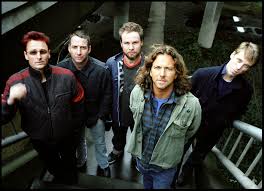WHERE?
We can imagine that often gloomy and rainy atmosphere of Washington favored the creation of heavy or rather melancholic sounds of guitars. It is often gloomier than on the photo above, I assure you. That is also why the name "grunge" was created - artists were somehow inspired by the dirty streets of the grey Seattle.
WHEN?
Literally grunge means grime or dirt but the term was first used to describe music in 1981 by Mark Arm to describe his band Mr. Epp and the Calculations. The grunge movement is best known for its distorted guitars, apathetic lyrics, long hair or flannel shirts. Grunge music is often credited with popularizing punk rock. Grunge is indeed heavily influenced by punk music, both musically and in its aesthetics and ethos, but the isolation of the Pacific Northwest allowed a genre to flourish away from the influences of the typical American cultural centers as Los Angeles or New York City.
the Melvins and the most recognizable member of the band - Buzz Osborne
After releasing Seminal Gluey Porch Treatments album in 1987, the Melvins would become one of the founding fathers of what eventually became known as "grunge" - a new, mutant form of punk rock that absorbed heavy metal as well as seventies hard rock bands such as Kiss and Aerosmith. Their sound contributed to the Seattle music, which had previously been dominated by art-rock bands.
I believe 99% of you will recognize this cover.
WHO?
In 1991, Nirvana released Nevermind, an album that would go on to become one of the 1990’s biggest and most influential records. To a then homeless Kurt Cobain, the massive exposure of grunge to the mainstream would be a dizzy few years. In fact, the grunge explosion that occurred following the record’s release really put Seattle on the musical map.
However, Nirvana was far from the forerunners of grunge. In fact, it was almost a decade earlier that the term “grunge” came into use, years before Nirvana was a band. The four Northwest bands that eventually came to define grunge on the larger, more successful stage were Alice in Chains, Nirvana, Pearl Jam, and Soundgarden. These four bands regarded as "the big 4 of Seattle" as well as few others dominated the world of rock for a next few years.
Pearl Jam with Eddie Vedder as the vocalist
If you're not a huge fan of rock music, you don't have to listen to it but I'd like to give you a sample of how my favourite 3 Grunge bands sound like: (and yep, I've chosen rather bearable and calm type of samples ;))
Pearl Jam - Garden
Nirvana - Where did you sleep last night?
Alice in Chains - Brother (MTV Unplugged)
Unplugged types of concert (meaning acoustic, producing sound not through electronic means) were (and still are) common among Grunge bands. I have posted an example above, showcased by MTV in 1996 unplugged concert of one of the representatives of grunge - Alice in Chains with amazing Layne Staley and Jerry Cantrell on vocal.
IS GRUNGE DEAD?
Unfortunately the golden age of Grunge passed with the death of remarkable individuals as Kurt Cobain from Nirvana or Layne Staley from Alice in Chains, but it really does not mean that Grunge is dead. Lifestyle of such artist shouldn't be promoted though, it is often associated with drugs and alcohol but for sure their music can be listened to and praised without such stimulants. Grunge is still alive in hearts of people listening to it and other artists bearing the legacy of the precursors mentioned above and trying to create their own input into the history of Grunge. Of course bands as Pearl Jam or Soundgarden (or other projects of Chris Cornell) are still functioning, however after such vivid epoch of rock music as the 80's and 90's, they are no longer regarded as the quintessence of Grunge.
READING COMPREHENSION TASKS:
1. How do the literal meaning of the word grunge correspond to the features of that type of music?
2. What does the author understand as the "golden age of Grunge music"?
3. What is the "Unplugged" type of concert?
4. What are the 3 main features of Grunge music? Try to use your own words.
4. Find the information about your favourite genre of music and answer the questions: Where? When? and Who?








No comments:
Post a Comment